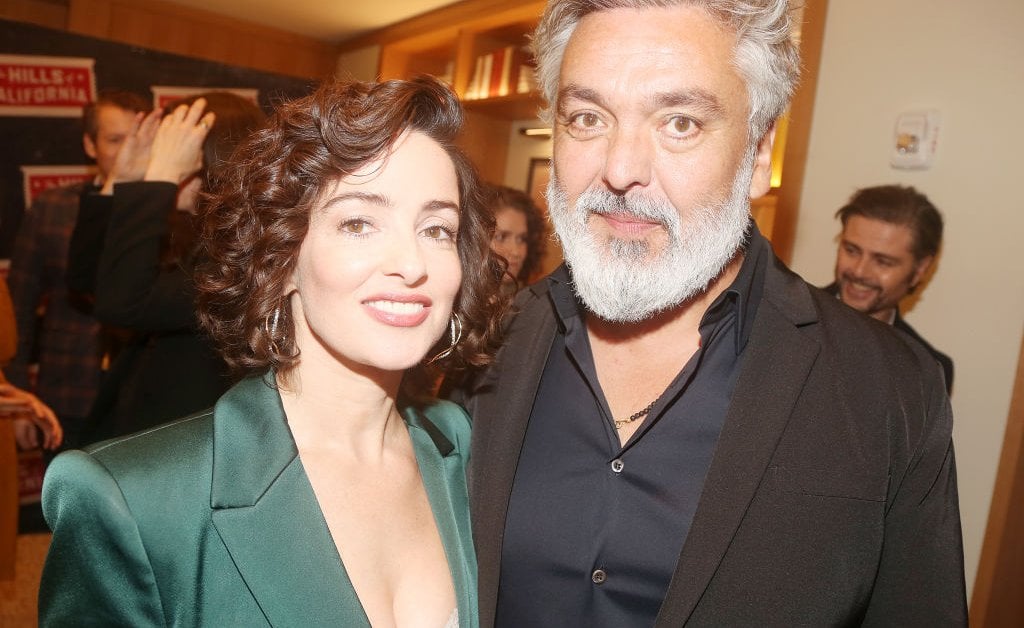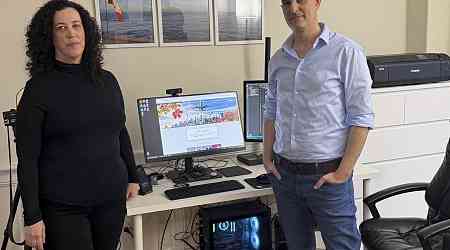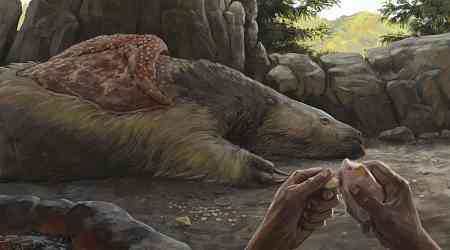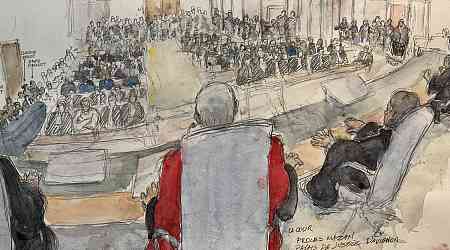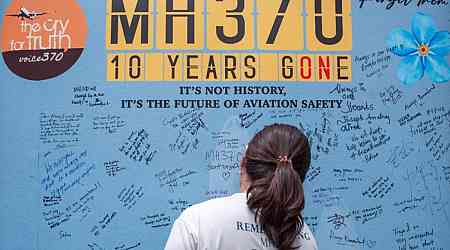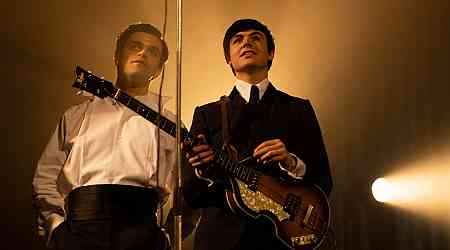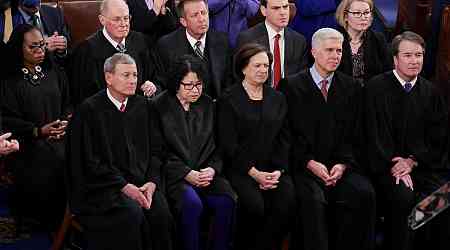
Jeremy “Jez” Butterworth and Laura Donnelly are a couple with two kids, who also work together; he writes plays, and she appears in them. But their collaboration goes deeper. Butterworth’s last play, the Tony Award-winning The Ferryman, was based loosely on the story of Donnelly’s uncle who was “disappeared” by the IRA during the Troubles in Northern Ireland. The couple’s newest production, The Hills of California, currently playing on Broadway, draws inspiration from both Donnelly’s childhood and his own experiences of loss and grief.
[time-brightcove not-tgx=”true”]The play stars Donnelly as both the matriarch of a faded British seaside resort who is determined to get her four daughters a career modeled on that of the Andrews Sisters (Donnelly and her sisters were pushed into gymnastics as children), and as one of the sisters in later life as she visits her mother’s deathbed (drawn in part from Butterworth’s interactions with his brothers as they looked after their dying sister). Butterworth seems to like a family business; several of his screenwriting credits, including Ford v Ferrari and Indiana Jones and the Dial of Destiny, are shared with one or another of his brothers.
During the production’s early days, Butterworth and Donnelly spoke to TIME about working together, fame, and that one time he punched Harvey Weinstein.
TIME: One of the inspirations for The Hills of California was the death of your sister Joanna. Can you talk about that?
Butterworth: She had ovarian cancer, and when they couldn’t operate on her again, she moved into a cottage next to the farmhouse where I was living at the time, and her end-of-life care lasted for six months. Different groups of friends and family would come stay on the farm and visit Joanna. And I think it was a happy time for her, despite what was going on. I’ve never seen anything quite like it, and I knew that one day that I would want to distill some of the atmosphere of how people behave around the dying and when they gather in different stages of their lives all under the same roof. How that plays out, in all of its comedy and intensity and banality and vividness, and I didn’t know how to do that for the best part of a decade.
You have sisters, Laura. Are any of your sisters in the arts?
Donnelly: No, everybody else in my family went on to do what you would term a normal job. But there wasn’t really a lot of that around me, full stop, growing up in the ‘80s in Belfast. People didn’t tend to have careers in the arts.
So in a sense, you are like your character.
Donnelly: Well, I can relate to her for sure. I had a recent experience where I went home, and I was walking around the area in which I had grown up, and I just had suddenly had a very, very strong memory of having been a 15-year-old girl in my bedroom and thinking, there isn’t a lot of magic here, and I want to go out and have a magical life.

I’m interested in how guys work as a couple. What do you like about working with Laura, Jez?
Butterworth: What I think Laura’s unique quality is, is dignity. And I think if dignity is at stake on the stage, everybody leans forward. When she’s on stage, you care about her destiny in terms of her dignity and whether that will be compromised, and whether she will be able to survive that. And whenever I talk about it, I kind of get chills, because I really do think that’s where drama lies, not in the outcome of sword fights, or whether the king dies, but just whose dignity is at stake. Because, of course, when you go to the theater, as opposed to the cinema, the audience’s dignity is at stake. They’re in a live event. Something might happen that will threaten their dignity. And when that works, and it comes off, it’s just so exciting.
How much do you write with her in mind?
Butterworth: I can sort of take an ingredient like Laura Donnelly and put it in the pot, and I can take an ingredient like a mother who can’t see what is coming, who’s building a house of cards that is going to be blown away. The idea is just like watching a spider building a web that a dog runs through. And I put those ingredients in the pot, and then I leave it on to simmer, and hope for the best.
Laura, what do you like about working with Jez?
Donnelly: There was something about his writing that I just felt like I knew how to sing it. Whenever I read anything that he’s written, whether it’s a character I’m going to play or not, it seems very, very clear to me how it’s supposed to be done, because he writes with a very particular rhythm and all the meaning and all of the emotion is in the rhythm. So I get the greatest reward from having these layered, complex, interesting characters, but at the same time, it doesn’t feel like terribly hard work.
How early in the process do you bring a play to Laura to read?
Butterworth: The way it’s come about is I write an act of the play, which is roughly around an hour, and she sees it the day before we read it through with actors. I think the main reason I do that is to kind of prove to [director] Sam Mendes and [producer] Sonia Friedman that I’m actually doing it, and sort of get them pregnant bit by bit, to put the show on. It also allows me to build the play and then get actors’ responses to what they just did, which for me is absolutely crucial.
Donnelly: Jez will talk a lot about the process as he’s doing it. I may not read anything until a first act is written, but he will have talked the whole way through what he’s considering, how he’s shaping it, and we will just chat over dinner or whatever about that. When I start my job in earnest, I won’t necessarily think that there is a problem with something. I just might be struggling to understand exactly how that moment takes shape, and when I ask the right question, that’s usually when Jez will say, actually, that’s because that’s not right.
And then when Sam Mendes gets involved, and there’s a difference of opinion, do you gang up on him?
Butterworth: Much as that would be fun to do, we don’t. It’s a little bit of a dance. Laura is like a steel trap in terms of what has happened in the rehearsal that day, so that there isn’t any kind of feedback or whispering campaign. She’s from Northern Ireland, where that gets you kneecapped. And Sam knows that. There’s just a trust between the three of us.
Donnelly: It’s essential to my job. I can’t have two different people sending me in two different directions from the moment we start rehearsals. I recognize Sam as my director, and he’s the person I’m going to for everything.
One of the things that this play is about is fame and ambition. You’re not yet a household name, Laura. Would you like to be?
Donnelly: Through my 20s, if I’d had that offered up to me on a silver platter, I would have taken it. I think I’d probably be dead right now if that happened. It was not for me at all, and now I can recognize that I’ve slipped a punch there. I have remarkably found myself getting to do what I consider to be the best work that any actor could possibly have available to them. And I can walk down the street, which is heaven.
How much of Joan’s ambition for her daughters comes from your ambition for your four daughters? [Butterworth has two daughters with his ex-wife, Gilly.]
Butterworth: I can’t work out in this story, whether these four daughters are gathering at my deathbed and I’m the mother upstairs, or whether I’m gathering with my four brothers at my sister’s death bed. When I’m writing plays, the thing they resemble most is dreams. I’m kind of going from one to the other. I’m up there and I’m down here. And also the four children who are being drilled, not just to prosper, but to soar, are partly based on stories of Laura’s youth and how her and her siblings were really thrown at gymnastics. I’ve jokingly called them the Family McTrapp. All of these things go into a soup in my head and in terms of which bit’s driving what, your guess is pretty much as good as mine. I think that if I had beefs that I just wanted to sort out with my past, and I was going to write them down and knock them off, then you’d have a stuffed bird and it wouldn’t fly.

Can you talk about your creative efforts with each other in a way that you can understand the other’s fears and hopes?
Butterworth: I feel like we’re just living a life that we’ve both made, and that day to day, week to week, astonishes us. But the fact is, this is the work that we make together, and we love doing it. I know that both of us revel in being here in New York for the third time together, that our life has taken on this pattern.
Donnelly: When I was 12 and thinking of the kind of life I might want to have as an actor, I could never have imagined it would be this very old school version of a brilliant playwright and actor in New York doing a new play. It feels to me that we could have been doing this same thing 80 years ago.
Butterworth: And we create these works together. The plot of The Ferryman was dreamt up by both of us in a car driving to upstate New York in a snowstorm. And when we got to our friend’s little cottage up there, we opened a few pots of wine, and by the morning, we had the story plotted completely between us, and it was filled with ideas to do with Laura’s family, things I had no idea about. Laura was absolutely intrinsic, not only to the performance, but to the creation. I think Tom Waits said that with his relationship with his wife, Kathleen Brennan, he washes and she dries. But in that case, we both washed and then she dried.
One of the things I noticed about some of the work that you’ve done is there’s this absent person, offstage, that everyone is waiting for or looking for. Are you writing about God?
I really don’t know the answer to that. I could say that absences haunt a lot of drama. Sydney Pollack, when I was just starting out, said when you create a story, you’re not building a house. You’re building a haunted house. You’ve got to put a ghost in it. Just feeling the presence of something without knowing what it is, is the thing that I instantly recognize to be important to make a drama live. And for me, theater’s always been about entrances and exits and what’s off stage and what’s on stage.
Laura, Your mother was a bereavement counselor. Did she talk about her work a lot? Was death a present force?
Donnelly: She didn’t discuss her work much. But as Jez said earlier, being where I’m from, not a lot did ever get discussed that was below surface level. I suspect that my mom’s involvement in that was because she specifically counseled victims of the Troubles and worked with other families of the disappeared. It was wrapped up in her own grief, and so I guess it was a way of trying to process that for herself by helping other people. When we started researching for The Ferryman, I began asking her questions about her brother, but there was just such silence around it. I always got the impression that it was just too painful for people to talk about.

In this play at least two of the sisters experience the same event, and come away with very different impressions of it. Is that what happened with your brothers when your sister died?
Butterworth: This has become, for me, a kind of a memory play. I’m absolutely haunted by the past. I spend most of my time, and have all my life, facing backwards, and I haven’t really got much of a clue what’s happening next week. It’s like being blind in one eye. I can tell you within 10 seconds, the week and often the day something happened. But my memory, which I used to consider to be a catalog of what actually happened, is not a catalog of what happened at all. It’s my version of what happened, and sometimes it is comically wrong. And I’ve just had to accept that there’s no such thing as the truth when you’re looking backwards.
There is a Me Too event in the play. Did you feel it was an important subject to bring up, given what we now know?
Butterworth: One of the reasons I run away from ideas and wait for them to chase me is to avoid exactly what you’re describing, which is to write something that feels modish or in any way of the day, because it won’t be of the tomorrow. I mean, I had my own experiences with Harvey Weinstein, when I made a movie 25 years ago, but the idea that I would choose a hot topic and write about it fills me with horror. I’d be lying if I said that my experiences of that haven’t found their way into the play, but they found their way into the play to lesser of an extent than my own experience of sexual abuse at the age of 15.
Let the record show that you punched Harvey Weinstein in the face.
Butterworth: Yes. It was in midtown Manhattan outside a hotel that I’ve not been to since or before. It was not a great hotel. He was bullying a producer that I was working with. This would have been late 1998, so a long time ago.
I am sorry to hear that you were sexually assaulted at 15. Has writing helped you process that? Is that partly where it comes from?
Butterworth: I think everything that I’ve ever written is driven by this kind of stew that contains all these things that I consider losses or are painful to me, and I can’t deal with in any other way. But what you’re asking is, does it help me with it? No, not at all. It doesn’t really get, as it were, transubstantiated into something beautiful. I put it alongside everything else that I would consider to be a profoundly sort of critical moment or loss in my life, and they all line up like birds on a wire, and you try and get some more to sing in unison.
The mother in this play champions an art form, a girl singing band that the audience knows nobody cares about anymore. She has no idea about Elvis Presley or rock. Do you sometimes feel that way about theater?
Butterworth: No, I don’t. I’m in a dream world. It just seems like the most magical, beautiful wind to be blown around this town. I’m very Tiggerish about it. It’s partly being a playwright, where you don’t really have a job, where you sort of breeze in and sit at the back, and it all looks wonderful. This is particularly to do with the sort of stories I’m trying to write. I don’t think they’re really going anywhere. I think people will always be gathering and trying to explain these losses that you can’t explain any other way other than drama, and I unashamedly see it as a religious ritual.
Are you really the West End’s coolest power couple, as British Vogue said?
Butterworth: I mean, there was a brief, horrible moment when Sarah Jessica Parker and Matthew Broderick were in town, horrible standoff, threw things at each other in a restaurant, and I don’t know who won, but I’d like to think we did.
Donnelly: I’m sure. They’re both tiny.
Given the choice of anyone in the world, whom would you like as a dinner guest?
Butterworth: James Joyce. And I’d also really have to have dinner with Harold Pinter, again.
Donnelly: I’m going with Cher.
Butterworth: Why didn’t I think of Cher? Because I’m scared of Cher, that’s why. I just know what’s gonna happen.
Donnelly: Gonna make a fool of yourself.
Butterworth: I’ve been in love with Cher since I was 4 or so and it hasn’t really changed. What’s that: 51 years? It’s a long time.
Having co-written Spectre, can you outline the essential qualities of the next Bond? And do you already know who it is?
Butterworth: No. And I think I’d have to sit here a long time before I came up with a subject I cared less about.
Is this because Cher was not a bond girl?
Butterworth: I’d like for her to have been James Bond.


















